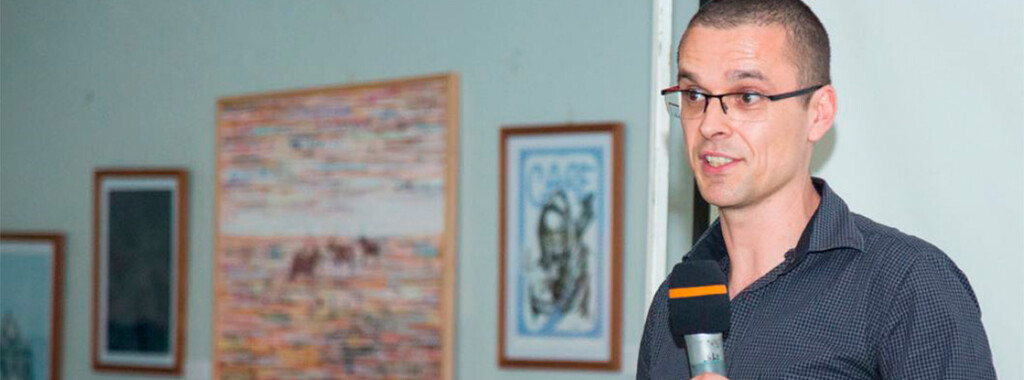"Both companies and NGOs gain from cross-fertilisation".

Bjorn Macauter
OVO stimulates local entrepreneurship in order to raise the standard of living in low- and middle-income countries. "The support of companies like Sioen is of gold value in this," says general manager Björn Macauter. "Although we are increasingly calling for strategic partnerships between NGOs and the business world. Because both parties reap the benefits of such a sustainable cooperation."
Since its foundation in 2000, Entrepreneurs for Entrepreneurs - OVO for short - has been promoting sustainable economic growth in low- and middle-income countries. How does this happen? By supporting local entrepreneurship. "After all, we are convinced that companies are the engine to raise the standard of living", says Björn Macauter, general manager of OVO.
Starting from own strengths
Why does OVO focus on local entrepreneurship, and not just on aid?
"People in low and middle income countries have the potential, the will and the strength to develop themselves. But for that, economic development and entrepreneurship are essential. Ultimately, employment provides an income, more and longer education, perspective and motivation, better social conditions ..."
"Entrepreneurship therefore runs as a thread through all the projects we support. We help entrepreneurs set up social and sustainable businesses. Or we support NGO projects that help fill the basic conditions for entrepreneurship, such as access to finance, training and tools."
Gold-standard support
Sioen also helps to finance two NGO projects through OVO. Why is this support so important?
"First of all, there is the money itself, of course. Thanks to financial contributions from organisations, NGOs can roll out their projects, reach their target group and advance them in the right way."
"But perhaps even more important than the funding, is the endorsed reference. A multinational with offices in 23 countries supporting OVO is a gold mine. It makes other organisations notice us. We are picked up more quickly, which means we also appear in the network of new partners. In short: the support of organizations like Sioen causes a snowball effect. And it goes both ways."
What do you mean by that?
"Organisations that support NGOs reap the benefits. To begin with, you are signing up for more than profit: you are achieving a social return and bringing certain problems to attention. That in itself is a boost."
"Moreover, corporate social responsibility (CSR) plays an increasingly important role in employer branding. People want to work for a company that also aims to have a social dimension. In terms of both recruitment and retention, CSR is an important asset."
"Finally, there are also other stakeholders, such as shareholders and consumers. They are taking more and more account of the global sustainability aspect. Dutch research, for example, shows that 79% of consumers change their buying behaviour based on social responsibility, inclusiveness and environmental impact."
Cross-fertilisation between business and NGOs
Why does OVO particularly advocate for collaborations rather than mere financial support?
"Organisations and NGOs can learn a lot from each other. Traditionally, companies mainly aim for economic return, while NGOs focus on the social one. That has changed over the years. The business community has embraced the SDGs, but struggles to apply that theoretical framework in practice. Aid organisations have tons of experience in that and can help the business community."
"Conversely, NGOs are gradually realising that permanently donating resources is not a sustainable strategy. Sooner or later their target group has to make the step to economic self-sufficiency. Something that companies can support. The interaction between both parties can be enormously enriching. Bringing different visions and backgrounds together leads to valuable cross-pollinations and fuels creativity and innovation. With OVO, we want to take on the role of facilitator: we bring parties together and set up a joint learning process."
Building on own values
What is needed for a partnership to be successful?
"There must be a connection with the company's own values. A partnership only delivers a clear return if you build on the company's own vision. Supporting projects that fit in with your company increases credibility and commitment."
"Sioen is a great example of this. The company values female leadership highly, so it is logical for Sioen to support a project for the emancipation of female entrepreneurs in Senegal. The financing of Rikolto's mission to reconcile agriculture and nature conservation in Indonesia is also a logical move, since Sioen produces in the country. Through a clear link with the company activities and vision, corporate social responsibility becomes a strategic choice with which you make a difference."
OVO: mission on two tracks
In order to stimulate local and sustainable entrepreneurship, OVO appeals to Belgian companies and entrepreneurs. "On the one hand, through them we focus on financing sustainable business initiatives and NGO projects. After all, more financial strength results in faster growth. On the other hand, OVO attaches great importance to knowledge transfer between Belgian companies and entrepreneurs, for example in the field of business management and technical support. To that end, OVO is developing a network of expertise. So we bring Belgian and African entrepreneurs together so that they can learn from each other."
Find out more at ovo.be

